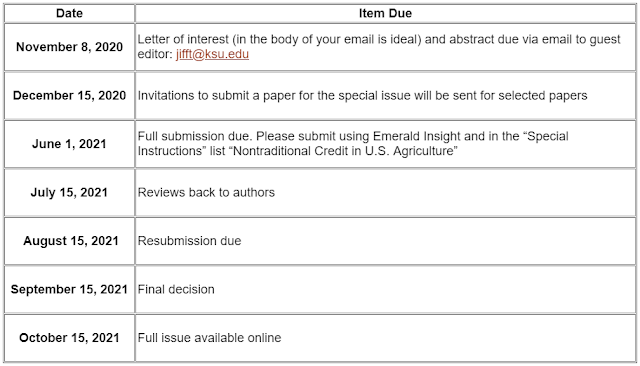Special Issue Topic: Nontraditional Credit in the U.S. Farm Economy
In cooperation with USDA, Economic Research Service
We are extending the deadline for abstract submissions for the special issue of the AFR to November 8 (email to jifft@ksu.edu or brewer94@purdue.edu). Other details are below and the updated call for papers is attached. A few key details:
- 500 word abstract submission by November 8 is necessary to be eligible for an honorarium. We will select up to 12 abstracts to invite for full submission based on both quality and how closely they adhere to the objectives of the special issue (see below and attached).
- Full papers are due on June 1. Papers that missed the Nov 8 abstract deadline can still be submitted, but will not be eligible for an honorarium and may be submit to capacity considerations.
- All papers in the special issue will undergo peer review; submitting an abstract and being invited to submit a full paper is a necessary but not sufficient condition for receiving an honorarium.
Many lending institutions provide credit to the agricultural sector, including the Farm Credit System, commercial banks, cooperative lenders, and the USDA’s Farm Service Agency. In addition, farms obtain credit through a variety of “nontraditional lenders,” including input suppliers, implement dealers, insurance companies, private equity firms, and others. Today, nontraditional lenders likely provide up to 20 percent of all credit to production agriculture, and the role of these lenders is likely to increase in the future. As farm operating margins have declined and existing working capital reserves have diminished, farmers’ demand for credit has increased in recent years and is expected to rise further. Yet, at the same time, tighter operating margins signal higher risk of default, and traditional lenders may face pressure to increase the terms and costs of borrowing. This means a significant portion of agricultural credit is held by institutions that are not well studied.
This special issue of Agricultural Finance Review will feature papers that provide a better understanding of the scope, significance, and risk profile of nontraditional lenders in the agricultural sector. The aim of the special issue is to collect a cohesive set of applied agricultural finance papers that address the dearth of publicly available information and research on nontraditional finance in U.S. agriculture. As such, we invite papers that either (1) follow guidelines for standard AFR submissions, or (2) provide novel data and insights that directly inform future research in this area. We expect this special issue will be of great interest to producers, the agribusiness industry, financial regulators, and traditional lenders. As such, we have partnered with the USDA Economic Research Service to provide an honorarium of $5,000 for accepted papers.
We welcome studies related to farm loans that are not originated at commercial banks or Farm Credit System lenders or public agencies such as the Farm Service Agency. Relevant areas of research may include, but are not restricted to:
- Volume and trends for nontraditional lending; analysis of the degree to which lending from nontraditional lenders is accounted for in official statistics or measures of farm sector financial health,
- Analysis of business strategies used by nontraditional lenders and/or how nontraditional lending is regulated; differences from traditional lenders,
- Assessment of demand for nontraditional credit; financial health of producers that use nontraditional lending as a source of credit,
- Assessment of credit supply risk: risk of the ag lending portfolio of nontraditional lenders, treatment under Chapter 12, etc.
- Analysis of nontraditional lending using state or regional farm management datasets, industry data, etc.,
- Analysis of lending practices and lenders used by farms that have been historically excluded from traditional lending institutions, including minority farmers.
To ensure a cohesive set of articles, we request a short abstract of 500 words or less by November 8, 2020. The abstract should establish why the study would make an important contribution to this special issue and summarize the proposed methodology. The authors of up to 12 abstracts will be invited to submit a full article (notification will be mid-December 2020) and this step is required for eligibility for an honorarium. Full articles must be submitted by June 1, 2021 for review. Articles should be between 3,000 and 9,000 words in length and must be of sufficient quality to meet AFR standards after one round of expedited review and revision. We include below a detailed timeline to assist in planning work on prospective submissions.
If you have any questions regarding the call for papers, please do not hesitate to contact the guest editorial team: Brady Brewer (brewer94@purdue.edu) and Jennifer Ifft (jifft@ksu.edu)
Timeline for submission and possible publication in AFR


No comments:
Post a Comment